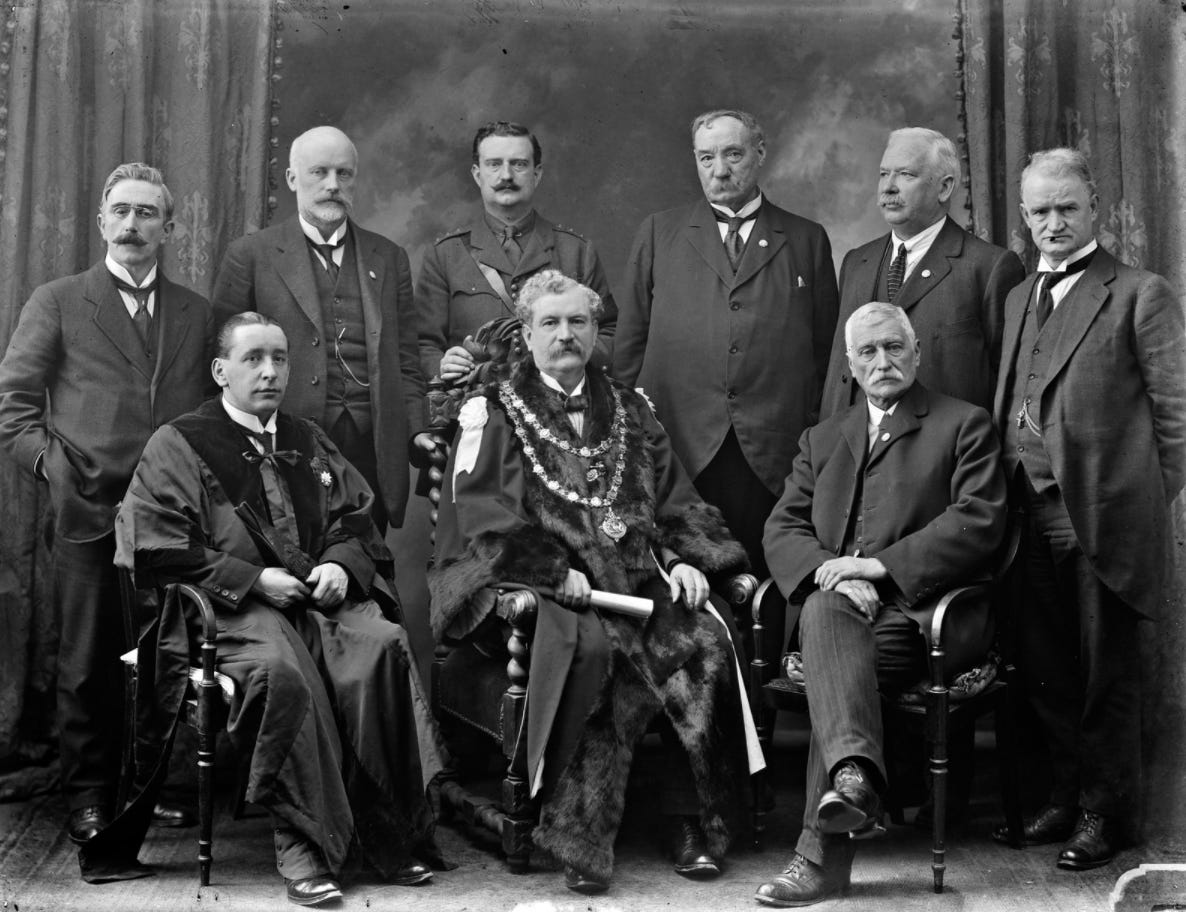Real men put an entire country's public health at risk
It's actually not a mystery why we don't care about others

On January 2nd, 2013, Gerda Lerner passed away in Madison, WI. She wasn’t a Madison native but it was there that she had built a pioneering PhD program in Women’s Studies. It was also there that she wrote most of her books, including one, The Creation of Patriarchy that proffered a deeply researched theory as to how we got here.
Gerda Lerner’s final years on Earth corresponded with the ascendence of a very specific political movement in her adopted home state (if you want to read more about the intense historical weirdness of Wisconsin politics, here’s this). 2010 saw the election of Governor Scott Walker and a majority Republican (and this goes without saying but yes, a majority white male) State Legislature. The next two years saw that group execute a series of well-documented flexes to solidify their power, the three pillars of which were Act 10 (which neutered public sector unionism), a Photo ID bill designed to suppress Black and Latinx voter turnout and a top-secret partisan redistricting plan. And while these efforts inspired a spirited protest movement, by the time of Lerner’s passing it had become clear just how handsomely their gambit had paid off. In the summer of 2012 Walker survived a recall attempt, a win that presaged sweeping Republican legislative victories later that fall. The new maps proved to be particularly successful; to this day it is now virtually impossible for Democrats to win back the state house without another redistricting plan. Walker would win another Gubernatorial race in 2014, giving him more than enough time to appoint a couple fellow travelers to the State Supreme Court.
Here’s the thing about having near-permanent ideological control of a Supreme Court and a legislative branch: No matter who sits in the Governor’s Mansion (Walker would finally lose to a Democratic challenge in 2018), your team retains full rights to block anything from happening that might offend your priorities or sensibilities in the slightest.
I share all this context because I live in a state whose legislature and Supreme Court have an immense amount of power right now and who appear obsessed with using that power for a single purpose: Blocking any and all attempts by the Governor or state health officials to enforce Covid protections. As a result, I also live in what is arguably the worst state in the country for Covid outbreaks. Hospitals across Northeast and North Central Wisconsin are stressed past capacity. Every week brings a new horrific record for cases and deaths. It is all immensely terrible. It is all immensely maddening. It is all immensely preventable.

In The Creation of Patriarchy, Lerner argues that a major shift in gendered power dynamics evolved between 3100 and 600 BC. Short life spans and high infant mortality rates meant that different tribes and communities were advantaged by having larger populations of young adult women. This demographic reality then inspired the idea, on the part of very specific regional leaders, that perhaps their women could be bartered and traded to attain other desirable goods and services.
There is a key problem that arises, though, whenever your society decides that it would be advantageous to treat other human beings as property. As it turns out, those kind of efforts are irreconcilable with the capacity for empathy and kindness that is hardwired into our brains. The trick you have to pull, then, is to construct a far-reaching philosophical/theological/legal justification for why a particular group of people is in fact less human. You really have to lean into it: we’re talking combatting all historical memories of matrilineality and destroying Goddess-worshiping religions. And that’s, per Lerner, how you end up with patriarchy: a millenia-long societal internalization and justification project, one that has proven not only to have tremendous staying power in its own right but which also provided a test run for later human-beings-as-property-justification schemes (you know, like racism).
Speaking as somebody who, as a white man, has done one heck of a lot of unquestioned internalization in my day, here’s what it feels like on the back end of that cultural project. You really do get to wake up each morning and (if you so choose) only have to care about yourself. You really do walk into every space with the belief (if you don’t check it) that your voice is valuable and smart and uniquely necessary. You really do get to reject any request for the common good that seems onerous or bothersome. You really do get to think of women as property (and you’re rarely discouraged from taking that thinking to its most violent extreme). You really do get to talk over women and non-binary people in meetings. You really do get to assume, if you’re in a heterosexual marriage, that you’re doing an equal amount of household and childcare duties (even if that’s (a). objectively untrue and (b). includes only easily observable tangible tasks and not the weight of the mental management of the household). You really do get to assume that your wife will be the one to quit her job if Covid-related-childcare pressures come for your family. And you really do get to hide away any fears or insecurity beneath a veneer of confidence and painted-on bravado.
To be honest, it’s all incredibly numbing and seductive and difficult to recognize even as you’re perpetrating it. It’s been the root cause of a lion’s share of the harm I’ve caused in my life. I’ve written a fair bit in this space about the relationships I’ve strained and the people I’ve hurt by being a bull in a china shop across racial lines, but my list of crimes of omission and commission across gender lines is so much larger.
It is intensely necessary, of course, for myself and every other individual white man to work their tails off to root out and transform these personal sexist patterns and practices. I’m going to resist the urge to focus solely on individual acts of boorishness right now, though, because while deeply meaningful they obscure the larger issue at hand. It’s easy to watch Mike Pence debate Kamala Harris and emerge with the takeaway “oh, that dude’s a sexist jerk.” We’ve spent far too long mistaking this or that Vainglorious Sexist and Racist Man in Power as being the disease themselves rather than a symptom of it. We are much better at pointing out individual sexism than we are at naming the broader myths of patriarchy: the idea that men can reject outright any requests that they care about the community as a whole rather than their own immediate wants and desires. If this sounds familiar, of course, it’s because it is precisely the mistake we make with trying to cleanse ourselves from the individual stain of obvious racism rather than the collective corrosive project of white supremacy.
I bring this all up now because people are dying unnecessarily (both in the state and the country where I live) and there’s a pretty clear culprit. No, it’s not that men are the only ones balking at masks and stay-at-home orders. And no, it’s not that legislative and judicial bodies standing in the way of community protection are solely male. It is true, though, as is always the case, that resistance (both individually and politically) to Covid protections have been disproportionally male. It is additionally true that, regardless of the gender of the individual ideologue, that the logic behind that resistance (“you can’t tell me what to do”) is deeply patriarchal.
Oh God I would love for all this to simply be a Trump problem. It would be great to just get to poke fun at his pale, wheezing attempts to pretend that his current post-Covid energy is a product of his intense virile masculinity and not the entire professional athletic league’s worth of steroids that have been pumped into his bloodstream. We didn’t get stuck here because of Trump though. We got Trump because we’re stuck here. We’re addicted to twin ideologies of individualism, one rooted in race, the other rooted in gender, each buoyed by and serving as the engines of a particularly rapacious brand of capitalism.
If we want community, we have to choose community. That choice, though, means a deliberate turning away from all of the ideologies and presumptions that stand in the way of community. We didn’t get here by accident. Just as is the case with racism and white supremacy, our ancestors chose to construct systems of patriarchy and sexism. And while the weight of centuries upon centuries of internalization is daunting, we must never forget that these ideologies are castles built in sand. Just as they were built up, so too can we knock them down and build something else in their place. In both cases, we can’t do so merely through competitive individual cleansing. There’s no version of “not all men” or “this is what a feminist looks like” peacocking I can do that actually helps matters. If we start from a principle of community care, though, there’s no shortage of steps we can take together. We wear a mask. We willingly pay more in taxes. We practice showing up differently in our marriages, our workplaces, our friendships. We take up less space and listen to community needs rather than the baying demands of our wounded ego. We build.
This week’s song: Dolly Parton/Linda Ronstandt/Emmylou Harris: After The Gold Rush




Lerner's book is a revelation, and I have never understood why it's not referenced more. It was a good jumping off point for this essay, and I'm glad younger thinkers are citing her. I need to read the second volume, too. I wish someone more recent had continued her exploration of patriarchy's beginnings.
A time of major masculine reckoning. Peacocks discouraged.